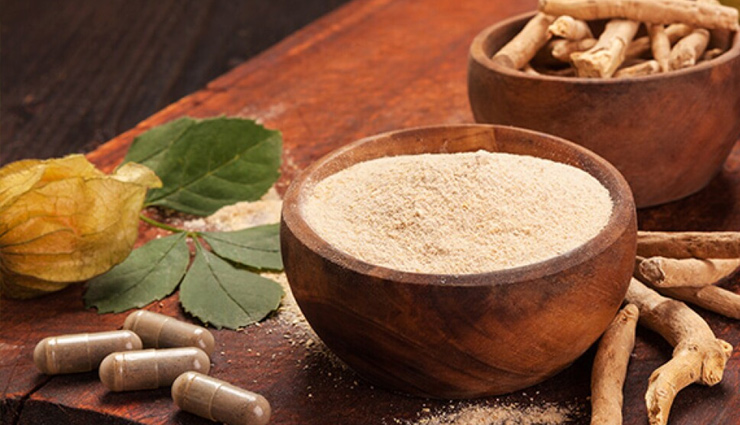- Home›
- Healthy Living›
- 15 Serious Side Effects Of Ashwagandha
15 Serious Side Effects Of Ashwagandha
By: Priyanka Maheshwari Sat, 07 Oct 2023 5:26:08

Ashwagandha, scientifically known as Withania Somnifera, is a widely used herb in Ayurveda. The name "Ashwagandha" is derived from the Sanskrit words 'ashwa,' meaning horse, and 'gandha,' meaning smell, due to its herb's strong horse-like odor. While Ashwagandha offers numerous health benefits, it's important to be aware of potential side effects. For individuals with allergies or autoimmune conditions, Ashwagandha may have adverse effects, as it possesses immunomodulatory and hypoglycemic properties. Additionally, there is some evidence suggesting a potential risk of abortions associated with its use. In this article, we will delve deeper into the potential negative effects of this herb. Continue reading to learn more about the side effects of Ashwagandha.
What Are The Side Effects Of Ashwagandha?

Harmful During Pregnancy And Breastfeeding
Ashwagandha is among the herbs that carry the potential to harm a developing fetus or even lead to pregnancy termination. Reports from the Sloan-Kettering Memorial Cancer Center suggest that ashwagandha can induce abortions.
For women, ashwagandha's side effects may also include an increased risk of miscarriage. There is limited information available regarding the safety of ashwagandha during breastfeeding. To err on the side of caution, it is advisable to avoid its use during pregnancy and lactation.

# May Cause Liver Damage
Individuals using commercial herbal products containing ashwagandha have been observed to suffer from liver injuries. Nevertheless, the precise mechanism by which this herb induces such injuries remains to be fully comprehended.

# May Lower Blood Sugar Way Too Much
Research indicates that ashwagandha has the potential to reduce blood sugar levels. While this can be advantageous, it may not be suitable for individuals taking diabetes medication. The herb's blood sugar-lowering effects could lead to excessively low blood sugar levels, potentially resulting in additional health complications.
Studies conducted on diabetic rats demonstrated hypoglycemic effects and alterations in insulin sensitivity. Therefore, individuals who rely on diabetes medications should exercise caution when considering ashwagandha supplementation, as it could produce adverse effects.

# May Aggravate Hyperthyroidism
Ashwagandha is recognized for its potential to elevate thyroid hormone levels. Consequently, individuals with hyperthyroidism may encounter unfavorable symptoms. Hyperthyroidism is a medical condition characterized by an excessive presence of thyroid hormones in the bloodstream.
For those diagnosed with hypothyroidism (underactive thyroid), it is crucial to seek medical advice before incorporating ashwagandha into their regimen. Ashwagandha has the potential to interact with medications related to hypothyroidism, potentially influencing thyroid hormone levels.

# May Aggravate Autoimmune Diseases
Ashwagandha extract is recognized for its immune-boosting capabilities. However, this attribute could pose challenges for individuals who have been diagnosed with autoimmune disorders such as rheumatoid arthritis, lupus, or multiple sclerosis. Medications prescribed for the treatment of autoimmune conditions are designed to suppress immune system activity, and incorporating ashwagandha into the regimen may potentially undermine their efficacy. A deeper understanding of the interactions between ashwagandha and autoimmune diseases is essential, and further research is required to elucidate these mechanisms.

# May Cause Gastrointestinal Issues
Excessive consumption of ashwagandha has the potential to irritate the gastrointestinal tract. As a result, individuals with stomach ulcers are advised to refrain from using this herb. Additionally, constipation was reported as a side effect in a study involving participants who consumed ashwagandha. It's worth noting that ashwagandha may also lead to diarrhea and gastrointestinal discomfort.

# May Cause Drowsiness
Ashwagandha has the potential to disrupt sleep patterns. Studies conducted on rats have shown that ashwagandha possesses relaxing properties that may induce drowsiness. Consequently, individuals taking medication for insomnia should be cautious, as combining ashwagandha with such medications could result in excessive sleepiness.
It's essential to avoid using ashwagandha alongside sleep medications like lorazepam, zolpidem, or alprazolam. While there is limited research on herb-drug interactions, exercising caution is advisable.
Furthermore, other studies have also confirmed ashwagandha's ability to promote sleep. Combining the herb with sedatives may intensify drowsiness, so consulting a doctor is recommended.

# May Lead To Erectile Dysfunction
Ashwagandha has the potential to negatively impact sexual function. According to a study conducted by researchers from the University of Ruhuna, ashwagandha root extract may lead to erectile dysfunction and a reduction in male sexual performance. While the herb is traditionally considered an aphrodisiac, these findings warrant further investigation through additional human studies.

# May Causes Allergies
Some individuals have reported anecdotal cases of allergic reactions associated with ashwagandha consumption. These reactions can manifest as skin rashes, itching, inflammation, chest pain, dizziness, headaches, and breathing difficulties. It's worth noting that individuals who are allergic to nightshades may also be susceptible to ashwagandha allergies. However, additional research is required to better understand this phenomenon.

# May Cause Fever
Ashwagandha use has been associated with an increase in body temperature in certain individuals, although the exact mechanism remains unclear. It's noteworthy that this elevated body temperature typically returns to normal within a few days. However, due to limited information in this regard, individuals with preexisting high body temperature or fever should consult their doctor before considering ashwagandha supplementation.

# May Cause Bleeding
Ashwagandha has been suggested to have the potential to cause bleeding, and individuals with bleeding disorders are advised against its use. It's essential to note that while there is anecdotal evidence suggesting this, there is currently no conclusive scientific research to support this claim.

# May Cause Dry Mouth
The excessive consumption of ashwagandha has been associated with dry mouth in some individuals. However, it's important to note that there is limited scientific research on this topic. To ensure your well-being, it's advisable to exercise caution and seek advice from your healthcare provider if you experience such symptoms.
It's worth mentioning that many of the reported side effects of ashwagandha are primarily based on anecdotal evidence. While ongoing research is exploring these effects further, it's prudent to take necessary precautions when using this herb.

# May Cause Kidney Damage
Ashwagandha's immunostimulatory effects may potentially lead to kidney allograft rejection, as indicated by research findings. Hence, individuals contemplating a kidney transplant should seek guidance and consultation from their healthcare provider.

# May Lower Blood Pressure
Although ashwagandha may offer advantages for individuals with hypertension when used independently, its potential to reduce blood pressure may pose risks when combined with other antihypertensive medications. Furthermore, it may be hazardous for individuals with hypotension (low blood pressure) conditions. Therefore, it is crucial to seek advice from a healthcare professional before incorporating it into your wellness routine, particularly if you have any preexisting conditions related to blood pressure alterations.

# May Induce Drug Interactions
Before incorporating Ashwagandha into your wellness routine, it is crucial to consult with a healthcare professional, especially if you are taking any medications. Ashwagandha may lead to interactions with various medications, including sedatives, liver medications, diabetes drugs, thyroid medications, cholesterol-lowering drugs, and hypertension medications. Additionally, it may influence the immune system, potentially interacting with immunosuppressants.
Furthermore, Ashwagandha can have other side effects. According to Mary Sabat, MS, RD, LD, "Despite being considered a calming herbal supplement, Ashwagandha may induce anxiety in certain individuals. In Ayurvedic medicine, it is believed that Ashwagandha's heating energy may trigger anxiety in some people due to its stimulating effects. The herb is also known to boost energy levels, alertness, and activity, which can be overwhelming for individuals prone to anxiety. Moreover, Ashwagandha can elevate cortisol and adrenaline levels, both of which are stress-related hormones."
She continues, "Herbal supplements can be potent and have drug-like effects on the body. While Ashwagandha serves as an adaptogen and helps with stress and sleep for most individuals, it may have the opposite effect, leading to anxiety and potentially weight gain in others."
Given the potential side effects of Ashwagandha, it is essential to seek advice from a licensed medical practitioner before using this herb in any form. Additionally, there are specific health conditions and circumstances where the use of Ashwagandha should be avoided altogether.
Who Should Not Take Ashwagandha
Ashwagandha should be avoided in any form if you have any of the following health conditions:
Pregnancy: Due to limited studies on its effects during human pregnancies, it is advisable to refrain from consuming ashwagandha while pregnant.
Hyperthyroidism: Ashwagandha has the potential to disrupt normal thyroid function and elevate thyroid hormone levels, posing risks for individuals with hyperthyroidism. It may also interfere with thyroid test results, so informing your doctor of ashwagandha usage is crucial.
Prostate Cancer: Ashwagandha may lead to increased serum testosterone levels, which could be problematic for individuals with prostate cancer.
Autoimmune Conditions: Ashwagandha's immunostimulatory properties may enhance the immune system, potentially diminishing the effectiveness of immunosuppressant medications commonly used to manage autoimmune disorders.
Diabetes: While animal studies suggest ashwagandha's potential to lower blood sugar levels, its effects on humans are not yet fully understood. Therefore, individuals with diabetes should consult their healthcare provider before using ashwagandha.
Liver Concerns: Excessive consumption of ashwagandha, beyond the recommended dose, may impact liver health or exacerbate existing liver conditions. Hence, consulting a doctor before incorporating it into your routine is advisable.
Upcoming Surgery: If you have an upcoming surgical procedure that requires anesthesia, it is important to discontinue ashwagandha use at least two weeks before the surgery to prevent potential drug interactions.
Although many of the potential risks associated with ashwagandha are primarily based on anecdotal evidence, it remains essential to exercise caution to prevent any possible negative effects.
Precautions To Be Taken
Taking ashwagandha in the correct dosage is crucial. It is essential to strictly adhere to medical advice to avoid any potential adverse reactions. Here are some additional precautions to consider:
- Ashwagandha root extract should be used only as a supplement, as it is less toxic compared to Withaferin A, the compound associated with anticancer properties.
- It is recommended to take ashwagandha with a meal, preferably with breakfast, and accompanied by a full glass of water.
- Due to potential interactions with certain drugs or medications, it is important to review your current medication regimen with a healthcare professional before incorporating ashwagandha.
- Individuals who experience gastrointestinal issues after taking ashwagandha should seek medical advice. Large doses of ashwagandha may lead to stomach upset, diarrhea, or vomiting.
The ideal ashwagandha dosage will be determined by your healthcare provider, and it's advisable to follow their recommendations. However, here are some general guidelines you may find useful.
Recommended Dosage
Powder (leaf): 1-2 teaspoons a day
Root: 1-2 teaspoons a day
Capsule: 1-6 g of the whole herb (by mouth) per day
Tea: 3 cups of the whole herb per day (1-6 g)
Tincture: 2-4 mL (by mouth), thrice a day





